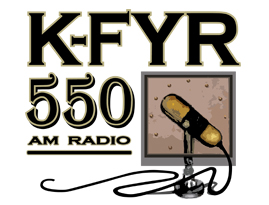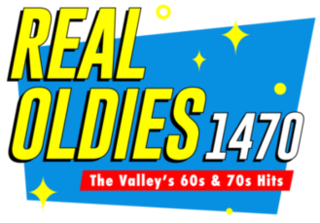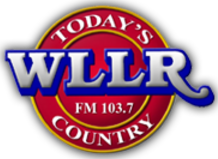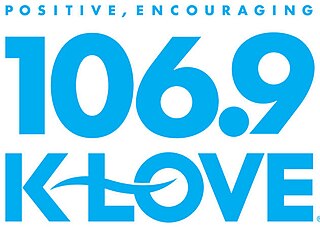Related Research Articles

KFYR is a commercial AM radio station in Bismarck, North Dakota. It airs a news-talk radio format and is owned by iHeartMedia, Inc. Some hours on weekends, the station plays oldies. The studios are on East Rosser Avenue in Bismarck.

WRVA is a commercial AM radio station licensed to Richmond, Virginia and serving Central Virginia. WRVA airs a news/talk radio format and is owned by Audacy, Inc. Established in 1925, WRVA is one of Virginia's oldest radio stations, and the most powerful AM station in the Commonwealth. For much of its history, WRVA billed itself as the "Voice of Virginia."

WOWO – branded News/Talk WOWO 92.3 FM 1190 AM – is a commercial talk radio station licensed to Fort Wayne, Indiana, serving primarily the Fort Wayne metropolitan area. Currently owned by Federated Media via licensee Pathfinder Communications, WOWO serves as the Fort Wayne affiliate for: Fox News Radio, The Glenn Beck Program, The Dan Bongino Show, The Sean Hannity Show, The Buck Sexton Show, Coast to Coast AM; and was the flagship station for the Fort Wayne Komets.

CKQB-FM is a radio station licensed to Ottawa, Ontario. Owned by Corus Entertainment, it broadcasts a Top 40/CHR format. CKQB's studios are located at 1504 Merivale Road in Nepean along with sister station CJOT-FM, while its transmitter is located in Camp Fortune, Quebec.

KOMP is a commercial FM radio station licensed to Las Vegas, Nevada. KOMP broadcasts an active rock radio format and is owned by Lotus Communications. Its studios and offices are on West Flamingo Road in Spring Valley in Clark County, using a Las Vegas address.

WSAN is a commercial radio station licensed to Allentown, Pennsylvania. It is owned by iHeartMedia and serves the Lehigh Valley radio market. It broadcasts an oldies radio format, with its studios and offices in the iHeart Broadcasting Center in Whitehall Township. It is the oldest station in the Lehigh Valley.

KCBQ is a commercial radio station in San Diego, California. It is owned by Salem Media Group and airs a conservative talk radio format. Studios and offices are on Towne Center Drive in San Diego's University City area. The transmitter is off Moreno Avenue in Lakeside, California. By day, KCBQ operates at 50,000 watts, the maximum power for American AM stations. Because KCBQ is not a clear-channel station, it must reduce its power at night to 2900 watts to avoid interfering with Class A stations KOTV in Tulsa, Oklahoma and WWVA in Wheeling, West Virginia, both clear-channel stations. KCBQ uses a directional antenna at all times.

KAAY is a commercial radio station in Little Rock, Arkansas, owned by Cumulus Media. It airs a Christian radio format of instruction and preaching, with most of the schedule made up of brokered programming featuring local and national religious leaders, including Charles Stanley, Jim Daly, John F. MacArthur, and Albert Pendarvis. Overnight, automated contemporary Christian music is heard. The station's studios are located in West Little Rock, and the transmitter is located off McDonald Road in Wrightsville. KAAY is Arkansas's primary entry point station for the Emergency Alert System.

WBAL is a commercial AM radio station licensed to Baltimore, Maryland. It is owned by the broadcasting division of Hearst Communications and broadcasts a news/talk radio format. The station shares its studios and offices with sister stations WBAL-TV and WIYY on Television Hill in Baltimore's Woodberry neighborhood. WBAL and WIYY are the only two radio stations owned by Hearst, which is primarily a publishing and television company.
Dale Seidenschwarz, aka Clyde Clifford, is the host of Beaker Street, a weekly freeform rock radio program.

WLLR-FM is a radio station licensed to Davenport, Iowa, United States, whose format is modern country music. The station broadcasts at a power of 100 kW.

WCCC (106.9 FM) – branded K-Love – is a non-commercial contemporary Christian radio station licensed to serve Hartford, Connecticut. Owned by the Educational Media Foundation, WCCC does not broadcast any local programming, functioning as the K-Love network affiliate for Greater Hartford, the Pioneer Valley and portions of the Naugatuck Valley. The station's transmitter is located in West Hartford; in addition to a standard analog transmission, WCCC is also available online.
WLYN is a brokered time radio station in the Greater Boston area broadcasting ethnic programming. The station is licensed to Lynn, Massachusetts, and is owned by Multicultural Broadcasting. Its programming is broadcast on 1360 kHz on the AM band.

WMEX is a commercial radio station licensed to Quincy, Massachusetts, and serving the Greater Boston media market. It is owned by L&J Media, headed by Tony LaGreca and Larry Justice. WMEX broadcasts an oldies format of hits from the 1950s, 1960s, 1970s and 1980s, as well as full service features including local DJs, news, traffic and weather. Late nights and weekends, it carries MeTV FM, a syndicated music service. The station's studios and offices are on Enterprise Drive in Marshfield.

WSVA is a commercial radio station licensed to Harrisonburg, Virginia, and serving the Central Shenandoah Valley. It broadcasts a news/talk format and is owned by Saga Communications, through licensee Tidewater Communications, LLC. The studios and offices are on Heritage Center Way in Harrisonburg.

WGMP is an alternative rock formatted radio station that serves the Montgomery Metropolitan Area, in Alabama, United States, also broadcasting via a broadcast translator on the FM band at 104.9 MHz.

KCOL is a commercial AM radio station licensed to Wellington, Colorado, and serving the Fort Collins-Greeley radio market. The station airs a news/talk format and is owned by iHeartMedia, Inc. The studios and offices are on Byrd Drive in Loveland, while the transmitter is off North County Road 13 in Fort Collins.

KCMC is a radio station licensed to Texarkana, Texas, United States. It serves the Texarkana metropolitan area. The station is currently owned by Cliff Dumas, through licensee BTC USA Holdings Management Inc. Studios are located on Olive Street, just west of the border with Arkansas. The station is an affiliate of the Dallas Cowboys radio network.
KSFN is a commercial radio station broadcasting a Spanish Regional Mexican music radio format. Licensed to Piedmont, California, the station serves the San Francisco Bay Area. The station is currently owned by Alfredo Plascencia's Lazer Broadcasting, through licensee Lazer Licenses, LLC. KSFN's transmitter is in an industrial section of West Oakland, California.
The Little Rock–Pine Bluff media market, which encompasses the state capital and two of the largest metropolitan areas in the U.S. state of Arkansas, maintains a variety of broadcast, print and online media outlets serving the region. The Little Rock–Pine Bluff market includes 38 counties in the central, north-central and west-central portions of the state, serving a total population of 1,172,700 residents ages 12 and over as of 2021. As of September 2021, it is ranked as the 59th largest American television market by Nielsen Media Research and the 92nd largest American radio market by Nielsen Audio.
References
- 1 2 3 Koch, Stephen. "KAAY: The Mighty 1090 Gave Arkansas to North America", Arkansas Business21 (8):S98, 2004-03-15.(Archive)
- ↑ Tarter, Steve. "On the air: Tune into unexpected AM find in the p.m.", Peoria Journal Star , 2007-04-22, p. C4.
- ↑ Heinselman, Karen. "Cedar Falls Band to be Inducted into Iowa Rock & Roll Hall of Fame", Waterloo Courier 2006-08-26.
- ↑ El Nuevo Herald, ALEJANDRO RIOS: Contracultura Archived September 14, 2009, at the Wayback Machine Sep. 12, 2009.(Spanish)
The author of the lines about Beaker Street in Cuba was one of those young Cubans who used to listen this famous radio station.